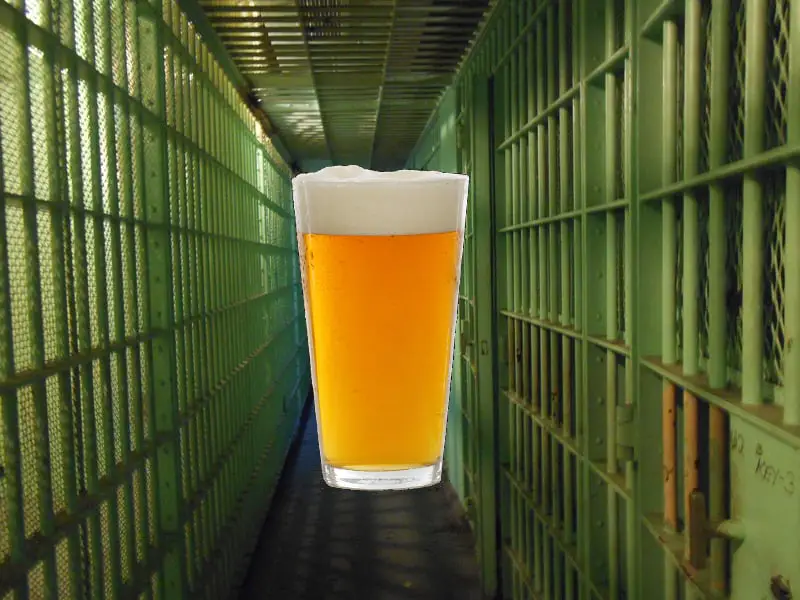Like many people intrigued by the idea of homebrewing, you might be wondering if it’s legal to make your own beer in the USA. Have no fear! I’m here to ease your understandable concerns on this question.
Now, you may think that the question over the legality of brewing beer at home is pretty obvious, but up until only a few years (Ok, maybe decades) it may not have been in your state….things have changed!
Brewing your own beer for personal consumption is legal in all 50 states but in some states is restricted under municipal law. The AHA site provides current federal and state homebrewing regulations. In all states, restrictions on production quantity exist, & sale of beer requires a liquor license.
Now that you know you can brew beer in your home and still be perfectly within your legal rights, you may be wondering why you’d want to brew it yourself.
Isn’t there already loads of delicious craft beers (buy beer from local breweries) available for purchase on the market? And besides, wouldn’t it take more equipment than you even have room for? And (wife’s voice) isn’t it dangerous?
Read on, because I have an answer to all these questions!
When did it become legal to make beer in all 50 states?

This was the most shocking thing for me, especially when you consider that most homebrewers you meet are fairly old dudes who started in their teens. Some of them are probably cold-hard criminals on par (almost) with Walter White from Breaking Bad, cooking up a Saison in their basements in the ’60s. So, when did it actually become legal to brew a lager at home?
It was only on October 14, 1978, that Jimmy Carter signed the bill legalizing home beer production for personal use in all 52 states and other jurisdictions. Would-be homebrew hobbyists celebrated, as it had been nearly 60 years since Prohibition had imposed its infamous alcohol regulations.
Although the bill legalized homebrewing on the federal level, it left the ultimate decision of homebrewing’s legality up to individual states.
So, while the popularity of homebrewing and craft beer (buy beer from local breweries) had really surged in the 80s and 90s, it was unbelievably still against the law to homebrew in Alabama and Mississippi. Finally, in 2013, homebrewing was legalized in these last two hold-out states. I’d lift my pint to that!
How much beer can you brew at home?
| Household occupants | Gallons* | 5 gallon batches* | Pints (16 fl oz)* | Bottles (12 fl oz) |
|---|
How much beer can you actually brew at home in the USA (per year)?
In the majority of states, you can brew 100 gallons of beer for every adult over age 21 per year. In a household of two or more adults, you can’t brew more than 200 gallons annually. No worries, as that’s still a good quantity of beer.
Check out your state or jurisdiction below just to be safe:
State | 1 adult in household (gallons/year) | 2+ adults in household (gallons/year) |
|---|---|---|
Alabama | 60 | 60 |
Alaska | 100* | 200* |
Arizona | 100* | 200* |
Arkansas | 100 | 200 |
California | 100 | 200 |
Connecticut | 50 | 100 |
Delaware | 200 | 200 |
District of Columbia | 100* | 200* |
Florida | 100 | 200 |
Georgia | 100 | 200** |
Guam | 100* | 200* |
Hawaii | 100 | 100 |
Idaho | 100* | 200* |
Illinois | 100 | 200 |
Indiana | 100* | 200* |
Iowa | 100* | 200* |
Kansas | 100* | 200* |
Kentucky | 100* | 200* |
Louisiana | 100 | 200 |
Maine | 100* | 200* |
Maryland | 100* | 200* |
Massachusetts | 100* | 200* |
Michigan | 100* | 200* |
Minnesota | 100* | 200* |
Mississippi | 100 | 200 |
Missouri | 100 | 200 |
Montana | 100* | 200* |
Nebraska | 100* | 200* |
Nevada | 100* | 200* |
New Hampshire | 100 | 200 |
New Jersey | 200 | 200 |
New Mexico | 100* | 200* |
New York | 100* | 200* |
North Carolina | 100 | 200 |
North Dakota | 100* | 200* |
N. Mariana Islands | ? | ? |
Ohio | 100* | 200* |
Oklahoma | 200 | 200*** |
Oregon | 100 | 200 |
Pennsylvania | 200 | 200*** |
Puerto Rico | 100* | 200* |
Rhode Island | 100 | 200 |
South Carolina | 100* | 200* |
South Dakota | 200 | 200*** |
Tennessee | 100 | 200 |
Texas | 200 | 200**** |
Utah | 100 | 200 |
Vermont | 100* | 200* |
Virginia | 100* | 200* |
U.S. Virgin Islands | 100* | 200* |
Washington | 100* | 200* |
West Virginia | 100* | 200* |
Wisconsin | 100 | 200 |
Wyoming | 100 | 200 |
*by federal law
** no more than 50 gallons per 90 days
*** “any person..?”
**** head of the family/unmaried adult
Can you sell homemade beer?
The short answer to this question is ‘no,’ not without the right permit, but there’re some ‘buts’ and ‘ifs’ behind that no. Check out this article I wrote which covers the ins and outs of monetizing your homebrewing hobby.
New to homebrewing? Please feel free to read my ultimate guide to brewing beer at home and where to start.
Why should I brew my own beer?
Aside from the fact that homebrewing is a lot of fun, it also teaches you to appreciate a good brew even more than you did before you started this hobby.
Become a real beer snob
Having a behind-the-scenes insight into how something is done opens up your senses and allows for greater enjoyment, and enjoyment facilitates relaxation. There’s a reason the homebrew slogan is “Relax, Don’t Worry, Have a Homebrew!”
I had been a beer drinker for donkeys years before I really appreciated what actually went into beer and just how easy it was to make. OK, the first batches weren’t perfect but by god they were drinkable.
More beer less money
If that doesn’t tempt you enough, there’s always the fact that you’ll save money in the long run by brewing your own beer.
I did a bit of a case study on this and I definitely found that you can brew cheaper beer and probably better beer the more you practice, which should be easy for an enthusiast! Check out the article I wrote on comparing the price of homebrew to store-bought beer.
Yes, you’ll have to pay for some equipment up front, but you can seriously get started with as little as a hundred bucks or so with a starter kit.
I really like this Northern Brewer starter kit because it comes with EVERYTHING a beginner brewer needs including a pot (brew kettle) to boil your wort in, you can check it out on Amazon to see if people haven’t already bought every last one. They are just great!
If you have slightly deeper pockets, then you can literally get everything (a little more everything) including a wort chiller and kegging equipment with this fantastic kit from MoreBeer.com. For under $500, you’ll probably not need to upgrade for many years if ever. Bargain!
Feel like a brewing god!
In addition to paying less for your pint, you’ll have the pleasure of pride in a job well done.
I cannot quite put into words the pride you feel when you see your first beer start to foam and ferment in the carboy and then that satisfying hiss as you open the first bottle (Yah, it actually carbonated). Not being a parent, I feel that it’s much the same pride you get from your kids, if not more!
Of course, the ultimate thrill is getting a little bit tipsy off your own beer! Magic!
Show off to your friends
In addition to feeling like a superstar making your own beer, you’ll make a lot of new friends.
I’m a member of a local Hash House Harrier running group. Basically, we run in the mountains and then drink a lot of beer while making fun of each other. I instantly became very popular when I started bringing my own homebrewed beer, which was free by the way!
My wife’s family is also very supportive and they always asked if I have another batch on so they can taste it. Kinda feels good if I do say so myself!
Get those creative juices flowing
A real bonus of sharing beer with friends as a homebrewer is that you can offload it (especially when it didn’t work out great) and get onto your next batch. I love beer, don’t get me wrong, but I can’t drink everything I make.
Having a ready and willing drinking audience will give you the ability to really let yourself go and you can exercise your creativity. A new batch every couple of weeks will soon hone your brewing skills.
Other reasons
Did I mention it’s fun?
Honestly, if you are trying to convince someone to let you brew, then I have the perfect article for you full of arguments for why you should (be allowed to) start brewing beer at home.
What type of beer can you brew?
The sky is the limit when it comes to what kind of beer you can brew at home. Have a look at the list of competition beers for the Beer Judge Certification Program if you need inspiration.
The only limiting factor is your own skill and experience because, in terms of brewing complexity, not all beer is created equal. Ales are generally easiest; lagers (this includes pilsners) are particularly troublesome for homebrewers.
Don’t get me wrong: you’re welcome to attempt a lager your first time around, but seriously, just don’t. There’re a lot more steps, time, and fermentation equipment involved.
To top it off, lagers don’t lie. Even the slightest flaw will stick out in the flavor like a sore thumb, whereas any errors made in the brewing of an IPA can be swept under a rug of hops.
And here’s the most important thing: “easy” doesn’t mean “not as good” in the world of homebrewing. Some of the simplest brew recipes yield the tastiest, most enjoyable beers. And that’s what it’s all about, isn’t it?
How to get started brewing beer
So, what do you need to start brewing beer at home? The basic equipment includes:
- a brew kettle (a few gallons larger than the volume of wort you’re going to boil)
- fermenter (different materials and sizes are available based on your personal brewing needs)
- bottling bucket (highly recommended)
- brewing ingredients (water, malts, hops, and yeast)
Each of these ingredients is integral to beer, but malt is what ends up making the alcohol as the sugars in the malt ‘feed’ the yeast. It’s really a catch 22 situation, you can’t make beer without either of them. (shop for your brewing ingredients on homebrewing.org).
The question is how you make those sugars accessible. You can use malt extract, a concentrated form of the necessary sugars, or you can use the malt grains themselves—usually barley—and process them on your own. This is the biggest difference between extract brewing and all-grain brewing.
So, this means that there are many choices for recipe kits on the market, but those are divided into these two main types: extract and all-grain. As you may imagine, extract is quicker, requires less equipment, and there’s more room for error. All-grain is trickier and takes longer, although it allows you more creative freedom.
Each has its perks, but the homebrew community, me included, recommends extract kits for anyone new to beermaking. Again, check out Northern Brewer’s starter kit and you’ll be brewing in no time, (See Amazon for details)
Can brewing beer be dangerous?
No, brewing beer isn’t dangerous. When people ask this question, they’re usually wondering whether harmful pathogens can develop in the beer. Rest assured, pathogens cannot live in beer. If they could, humans would not have drunk beer instead of water in ancient civilizations where the water was unsafe for consumption.
And if it’s methanol poisoning you’re worried about, you’ll be interested in this article I wrote on the subject. (Short answer: no, you don’t need to worry about methanol poisoning with homebrewing. Methanol comes from distilling, and beer isn’t distilled.)
The only real danger for me comes from the risk of exploding bottles, which I explain how to avoid in my other article here.
Why is it illegal to make moonshine but not beer?
The main reason you can’t make moonshine without a distiller’s license is safety. If you mess up when making your own beer or wine, the worst possible outcome is disgusting beer or wine. But if you err when producing moonshine, people can get seriously hurt—or worse.
Say there’s a leak in the still and ethanol gas gets released. If the still isn’t sealed and vented correctly, you’re looking at a possible fire… or even an explosion.
Not an issue when making beer although exploding glass carboy can happen if you don’t use an airlock properly.
You’ve probably also heard the expression “blind drunk.” That likely originates from the unfortunate people who’ve ingested methanol when drinking moonshine. Methanol (aka “wood alcohol) is a by-product of distillation, and it’s bad stuff. It can damage your optic nerve. It can also kill you if more than a few ounces are consumed.
Methanol comes out in the first few ounces of moonshine that drip from a still. Good moonshine distillers catch the methanol and discard it. Bad distillers may not know to do this or may even want to use the methanol for the infamous drunkenness it causes. (But for the sake of safety, I reiterate: If extreme drunkenness is what you want, get it some other way besides methanol!)
Either way, a lot can go wrong with moonshine that can’t go wrong with beer, and that’s the main factor behind amateur moonshine’s illegality.
How can you start a brewery to sell beer legally?
You’ll need capital, permits, and a business plan. I’ll touch on the first two in this article.
How much money?
Just in terms of brewing equipment, you’re looking at between $100,000 and $1 million. That’s not including things like your location, utilities, and even flooring (especially important for a brewery. You’re dealing with heavy equipment and the inevitable spills of acidic beer).
Speaking to my friend who was headhunted to start up a small brewery in Taipei, he said that the equipment was pricey but you’d soon make that back if you market the beer well.
(buy beer from local breweries)
What kind of permits?
First of all, apply for a federal brewing permit with the Alcohol and Tobacco Tax and Trade Bureau. The application is free, and it’s about a four-month process. Note that all of your brewing equipment has to be installed and ready to go before the government approves this permit.
You’ll also need your state liquor license in order to serve beer. This varies from state to state. This website provides a state-by-state rundown of what to do to get this. On average, getting local licensing takes 45 to 60 days.
So, if you are satisfied that you can now legally start brewing, why not join me on my YouTube channel for more tips and advice to brew a perfect pint.






